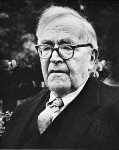Who was the first Darwinist?
Cicero Intelligent Design Supporter?
Robert Boyle and the Borders of Science.
The Watch Analogy.
I have recently been reading this book:

While it is not directly related to ID some parts (especially the historical background) provide a useful setting for the arguments that are raging today.
The authors begin by portraying secularism as especially a post-christian phenomenon. It involves a conscious rejection of a christian world view.
Historically the word secularization had a very narrow and specialised meaning. When a priest was transferred to a parish responsibility he was said to be secularized. Gradually the use of the verb widened. With the separation of the roles of the Pope and the emperor the division between spiritual and secular became institutionalised.
A quote from Harvey Cox's book "The Secular City" (a response to Augustine's "City of God") distinguishes between secularization and secularism. Secularization is a description of a historical process whereas secularism is a modern ideology.
The authors argue that positivism (restriction of knowledge to mathematics, logic and empirical verification), humanism (humanity is the norm of all knowledge- man is the measure of all things), relativism (there are no absolute values or transcendent norms), pragmatism (judgements of what is good and useful are restricted to observable consequences), pluralism (there is no possibility of ultimate unity within diversity) and existentialism (humans are bound to work out their meaning within the limits of time) are all groupings within the genus of secularism. Each shares the view that all possible knowledge is restricted to the temporal- the metaphysical quest is dead. There is no transcendent, no eternal only phenomena enclosed within space and time. The classical Greek quest for the meta of physics and the supra of nature the unity in diversity, has been abandoned.
The impact of secularism has been huge and dramatic. The Judeo-Christian consensus has gone. Where once the church dominated higher education it has now been relegated to one voice amongst many. It has lost its nerve. Theology was once the queen of the sciences because it gave unity and a point of integration to all of knowledge. Philosophy was the meta-physical helper to theology. The queen has been tipped off the throne and onto the street.
The rise of secularism was the other side of the see-saw to the decline of the traditional apologetics of Christianity. The Enlightenment dealt the crippling blow to traditional Christian apologetics.
Historically the traditional Christian apologetics used human reason to defend the Christian world view. After the Enligtenment and the work of Kant and Hume in particular there was a move to deny the validity of rational apologetics as the main way to defend the Christian faith.
The view came in that the Christian faith depends not upon the convictions of the mind but the
 feelings of the heart and the choices of the will. Christianity in this view is not founded upon argument. Karl Barth repudiated any argument for divine revelation. "Dogmatics is only possible as an act of faith." A new view of the meaning of the word "faith" began to permeate the thinking of Christian leaders. Paul Tillich argued that a God who could be proved would be no God. For these thinkers Christianity offered not an argument but a choice. They argued that Christianity did not call on people to face up to what could be known as true but called on people to make a leap of faith in the darkness. This view of the Christian faith has been called "fideism."
feelings of the heart and the choices of the will. Christianity in this view is not founded upon argument. Karl Barth repudiated any argument for divine revelation. "Dogmatics is only possible as an act of faith." A new view of the meaning of the word "faith" began to permeate the thinking of Christian leaders. Paul Tillich argued that a God who could be proved would be no God. For these thinkers Christianity offered not an argument but a choice. They argued that Christianity did not call on people to face up to what could be known as true but called on people to make a leap of faith in the darkness. This view of the Christian faith has been called "fideism."Fideism became the popular alternative to the apparently discredited "natural theology".
It is the relationship between what has historically been called "natural revelation" or "general revelation" that interests me for the purposes of this blog. The study of natural revelation has been called "natural theology." It is based upon the idea that God has revealed himself in space and time by the nature of what can be observed by the senses without aid from any special verbal revelation in the form of sacred writings etc.
Historically Thomas Aquinas is seen as the greatest proponent of this view but it finds its roots much further back in the writings of the Apostle Paul and in the Hebrew Scriptures.
William of Ockham and John Duns Scotus were the main opponents of Aquinas. Ockham argued that no cogent proof of God's existence could be given- this was a question that had to be placed in the realm of "faith."
Notable followers of Ockham's views were Nicholas of Cusa in the fifteenth century and Francisco Sanche, Michel de Montaigne and Pierre Charron in the sixteenth century.
This view however met is greatest exponent in Immanuel Kant.

No comments:
Post a Comment